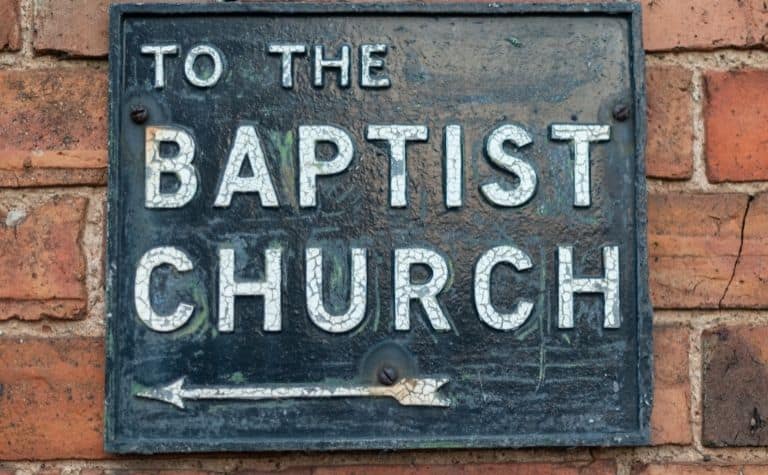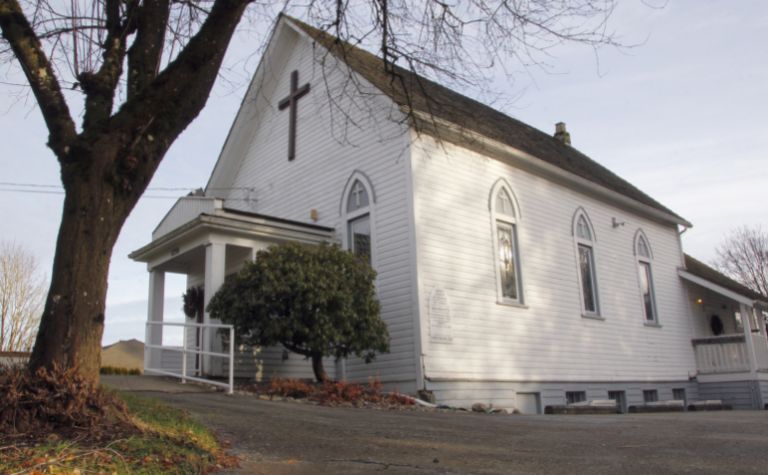Baptist and evangelical churches are numerous in America, and the influence of each tradition has also spread to different continents and countries. As a result, many people have heard the terms “Baptist” and “evangelical” and may even have such a church nearby. Yet sometimes, the similarities and differences between the traditions aren’t readily apparent, so people are curious to know how they compare.
The Baptist denomination started in 16th-century Europe but has had its greatest impact in America, where it is one of the largest denominations. Evangelicalism was born in early 20th-century America and is theologically conservative and socially compassionate. Both traditions are Protestant.
How did the Baptist and evangelical traditions start? What do “Baptist” and “evangelical” mean? Can a person be Baptist and evangelical? What is the theological and social worldview of each tradition? How do their beliefs about God, the Bible, and other doctrines compare? Keep reading to learn the answers to these questions and others.
Also, see Are Baptists Allowed to Dance? to learn more.

What’s the Difference Between Baptists and Evangelicals?
Because the Baptist tradition mainly exists in denominations (e.g., Southern Baptist), and evangelical is a multi-denominational movement, a church or Christian could be both.
Many conservative Baptist churches share the broader evangelical movement’s theological convictions and social awareness.
| Baptist | Evangelical | |
|---|---|---|
| Name | The word “Baptist” comes from the practice of “believer’s baptism,” i.e., only professing Christians, usually adults or youth, are baptized, not infants. | The word “evangelical” comes from the Greek word euangelion, meaning “gospel” or “good news.” The term describes a gospel-centered or cross-centered worldview and approach to ministry. |
| Origin | The Baptist tradition has roots in English Puritanism and the Anabaptist tradition in Europe. However, it took shape and grew in America. | The modern use of the term originated in the 20th century. It’s distinguished from liberalism and fundamentalist movements. Fundamentalism has similar theology to evangelicalism because both movements have a high view of Scripture. |
| Branch | The Baptist tradition is Protestant. It affirms that salvation is by grace through faith in Christ alone. | Evangelical is also Protestant and traces its roots to the New Testament via the Protestant Reformation. |
| Early influencer(s) | John Smyth (1554-1612) in England, Roger Williams in America (1603-1683) | English preacher Charles Spurgeon (1834-1892), American preacher Dwight L. Moody (1837-1899), and many others. |
| Significant writing outside the Bible | The London Confession of Faith (1689), the New Hampshire State Baptist Convention (1832) | Evangelicalism values the same writing important to Protestantism, including works from various denominations emphasizing a gospel-centered approach to evangelism, missions, biblical interpretation, and more. |
| Baptist | Evangelical | |
|---|---|---|
| Organization | One of the Baptist tradition’s central convictions is the local church’s autonomy. Baptist churches have congregational forms of church government. | Evangelicalism isn’t a denomination but a movement consisting of numerous denominations and even non-denominational churches. Evangelical churches can have congregational, presbyterian, or episcopalian church government. |
| What are the largest denominations in the tradition today? | The Southern Baptist Convention (SBC) has about 17 million members. The National Baptist Convention, USA, Inc. (NBCUSA) has about 8.5 million members. | Churches in any denomination can be called “evangelical” if they centralize the gospel and emphasize other characteristics of the movement, such as valuing conversions and applying their faith through social causes like caring for the poor, widows, and orphans. |
| Divisions | There are dozens of Baptist denominations. Some are conservative (e.g., SBC); others are liberal (e.g., American Baptist Churches, USA). | There is significant diversity within evangelical Christianity. Evangelical churches can have different theologies (though they are mostly Protestant), organizational models, and convictions on social issues. |
| Theological and Social worldview | It depends on the denomination. The SBC is theologically and socially conservative. Others, like American Baptists Churches USA, welcome liberal and progressive ideas and practices. | Historically, evangelical churches are conservative theologically and socially. In recent years, some self-identifying evangelical churches have drifted from conservative theology and adopted modern social values on various issues. |
Also, see Christian Denominations Comparison Chart to learn more.

Baptist and Evangelical Beliefs: A Comparison
Diverse theological viewpoints exist in Baptist and evangelical churches, which makes them unique among Protestant Christian denominations and movements.
While some Baptist churches hold a strong view on certain doctrines, most welcome members, regardless of their convictions. In a Baptist church, Calvinists and Arminians, or Premillennialists and Amillennialists, may worship side by side.
| Baptist | Evangelical | |
|---|---|---|
| Theology | The Baptist tradition is one of the most doctrinally diverse denominations in Protestantism (e.g., Baptists may be Calvinist or Arminian); Baptists generally agree on Believer’s Baptism, the autonomy of the local church, and the separation of church and state. | Evangelicals are historically conservative Protestants. They can be Pentecostal or not, Calvinists or Arminian, Premillennial or Amillennial. They are theologically diverse. |
| Scripture | Baptists believe in the inspiration and authority of Scripture. Many conservatives accept and defend the terms “inerrancy” (i.e., Scripture has no errors) and “infallibility” (i.e., Scripture can’t lead astray in belief or practice). Moderate-liberal churches read and teach Scripture more selectively. | Historically, all evangelical churches have a high view of Scripture and believe its authoritative, even if they don’t always use the terms “inerrancy” and “infallibility.” |
| God | Baptists believe in the Trinity; one God exists in three persons. The Father, Son, and Holy Spirit are each fully divine. | Evangelicals are devout, committed Trinitarians. |
| Christ | Jesus is the second person of the Trinity. He is God in human flesh. He is 100% God and 100% man. Jesus was born of a virgin, lived a sinless life, died as an atonement for sin, and was physically resurrection on the third day. | Evangelicals also believe that Jesus is the second person of the Trinity, was virgin-born, and sinless. Evangelicals believe in the atonement and Jesus’ resurrection. |
| Holy Spirit | The Holy Spirit is the third person of the Trinity. He is fully divine. The Spirit applies the salvation that the Father planned and that the Son earned for sinners. He gives spiritual gifts to believers that they are to use for the edification of the Church. | Evangelicals have the same core beliefs as Protestants about the Holy Spirit. Some evangelical churches embrace Pentecostal spirituality, like speaking in tongues, while others don’t. |
Also, see What’s the Difference Between Baptist and Southern Baptist to learn more.

| Baptist | Evangelical | |
|---|---|---|
| Salvation | Conservative Baptists believe that salvation is only possible in Christ. Baptists can be Calvinists, Arminians, or something else. | Evangelical churches believe that salvation is by grace through faith in Christ alone. They can be Arminian, Calvinist, or something else. |
| Sacraments/ Ordinances | There are two: Believer’s Baptism (but not infant baptism) and the Lord’s Supper; Baptists don’t believe sacraments are channels of grace. | Baptism and the Lord’s Supper |
| Baptism | Sometimes referred to as “credobaptism” (credo = “I believe”), the sacrament is for professing believers who have trusted Christ for salvation. | Evangelical churches may practice “Believer’s Baptism,” which means they only baptize adults or paedo-baptist (paedo = “child”), which means they baptize children. |
| The Lord’s Supper | Also called “communion,” most Baptists believe consuming the bread and cup is a memorial of the atonement of Christ. | Evangelicals have various views on the Lord’s Supper. For example, Lutherans believe in consubstantiation, Presbyterians believe in the real presence of Christ, and Baptists believe the bread and cup are memorials. |
| View of the end times | Baptists hold various views on the end times. Some believe in the rapture; others don’t. All believe in the Second Coming of Christ. | Evangelicals hold various views on the end times. Some believe in the rapture; others don’t. All believe in the Second Coming of Christ. |
Also, see What Do Baptists Believe? to learn more.
References:
[1] Source
[2] Source
Related Questions
The Baptist tradition is one of the largest branches of Christianity in America and around the world. Historically, some Protestant denominations have prohibited their members from activities like...
Baptist denominations and churches, which date to the 17th century, comprise one of the largest branches of Christianity in the Western world. While Christian churches in Baptist networks and...
